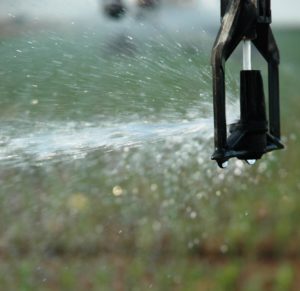Texas A&M AgriLife Research joins others to advance irrigation innovation
Writer: Kay Ledbetter, 806-677-5608, skledbetter@ag.tamu.edu
Contact: Dr. Brent Auvermann, 806-677-5600, b-auvermann@tamu.edu
DENVER – Texas A&M AgriLife Research is poised to be a catalyst in the next major leap forward for water and energy use relating to food and landscape irrigation systems.

Texas A&M AgriLife Research is a part of the Irrigation Innovation Consortium to advance irrigation innovation. (Texas A&M AgriLife photo by Kay Ledbetter)
The Foundation for Food and Agriculture Research, or FFAR, a nonprofit organization established through bipartisan congressional support in the 2014 farm bill, announced a $5 million grant to launch the Irrigation Innovation Consortium. The FFAR grant is being matched by project partners for a total initial investment of $10 million over five years.
Initial participants are creating a platform for other universities, federal agencies including the U.S. Department of Agriculture Agricultural Research Service, and the private sector to work together on the critical water challenges facing agriculture, municipalities and industry, according to FFAR officials.
As a collaborating partner, AgriLife Research, one of five premier public entities on irrigation in the nation, will help provide research to accelerate the development and adoption of water and energy-efficient irrigation technologies and practices.
The other four universities are: California State University-Fresno, Colorado State University, Kansas State Research and Extension-Kansas State University and the Robert B. Daugherty Water for Food Global Institute at the University of Nebraska-Lincoln.
At present, founding industry partners are: Irrigation Association, Jain Irrigation, Lindsay Corporation, Netafim and the Northern Water, but the FFAR research team will continue recruiting additional industry partners.
“We will need to transition to a sustainable funding model fueled by marketable irrigation technologies and return on investment to our industry partners,” said Dr. Brent Auvermann, AgriLife Research center director at Amarillo.
Auvermann represented the Texas agency when the announcement was made April 27 at the Water in the West Symposium hosted by Colorado State University in Denver.
Auvermann said AgriLife Research will distribute about $675,000 of the grant across the state with about a dozen faculty members participating. Remote-sensing using drones and satellite information, systems integration and management, and use of big data or Internet of Things will be the primary areas of focus for AgriLife Research participants.
According to FFAR officials, public sector researchers and industry partners will co-develop, test, prototype and improve innovations, equipment, technology, and decision and information systems designed to equip “farms of the future” with cutting-edge technologies and optimization strategies to enhance irrigation efficiency.
“We will be accelerating the development and adoption of new controls and precision application systems,” said Dr. Bill McCutchen, executive associate director of AgriLife Research, College Station. “We’re no longer optimizing for whole-farm averages; we are optimizing our irrigation management for year-to-year and field-to-field variability.
“Weather changes such as the amount and timing of rainfall, irrigation scheduling, crop selection and management practices all make a difference when trying to improve water and energy efficiency at this stage,” McCutchen said. “If we can help producers predict what is going to happen, we can help them capitalize on what eventually does happen.”
Water-conscious farmers have to consider water availability, crop mix, energy prices, energy sources, commodity prices, tax rates, soil types, application efficiency, operating pressure and pumping lift to manage irrigation efficiently and affordably, Auvermann said.
“A large chunk of the work we will do will involve the Internet of Things, using many low-cost sensors to gather useful information and tie it all together with a user interface that permits the producer to manage his resources in near-real time,” he said.
Auvermann said public researchers also will work closely with private companies to commercialize products. The goal is to match up research and technology to real-time or near-real-time decision-making and put the right tools in the hands of the producer to implement new irrigation strategies for the optimization of genetic advancements.
A second benefit of this is the maximization of taxpayer money, which is leveraged with federal and private funds, McCutchen said. Royalties earned from patented technologies will be fed back into the consortium to develop even more advances for producers and ultimately benefit taxpayers.
“Return on investment is what drives agricultural research these days,” he said. “Taxpayers expect their public research money to pay dividends in the marketplace with new, improved and affordable technologies that achieve important environmental goals, like water conservation.”
“The new Irrigation Innovation Consortium unites top university research talent with industry to promote practical advancements in irrigation technology and water management practices,” said Dr. Sally Rockey, FFAR executive director in Washington, D.C., in making the announcement.
“We are optimistic that outcomes from this collaborative effort will help producers grow more food with smart water management and strengthen the resilience of our food supply,” Rockey said in her statement.
The FFAR announcement said the goal is to create an internationally recognized, self-sustaining center of excellence that promotes and enhances water and energy efficiency in irrigation, ultimately creating greater resiliency in food and irrigated landscape systems. Organizations interested in joining the Irrigation Innovation Consortium are invited to contact Dr. Stephen Smith, Fort Collins, Colorado, executive director of the Irrigation Innovation Consortium and FFAR advisory council member at swsmith@buenavidafarm.com.
-30-


